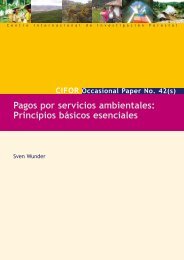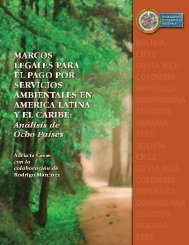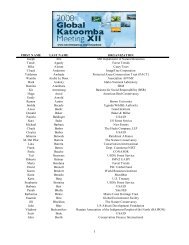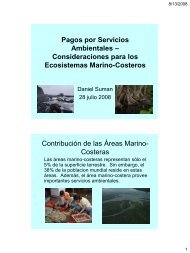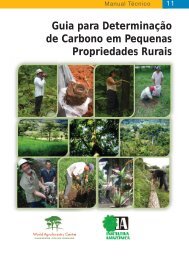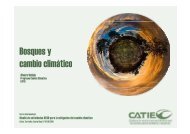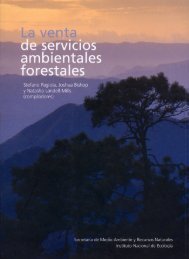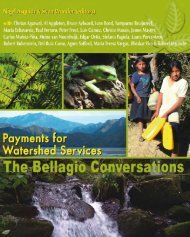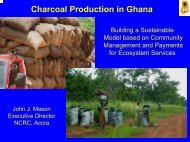Guide on Climate Change and Indigenous Peoples
Guide on Climate Change and Indigenous Peoples
Guide on Climate Change and Indigenous Peoples
- No tags were found...
You also want an ePaper? Increase the reach of your titles
YUMPU automatically turns print PDFs into web optimized ePapers that Google loves.
• State <strong>and</strong> NGO z<strong>on</strong>ing offorest l<strong>and</strong>s without theinformed participati<strong>on</strong> offorest dwellers.• Potential increase <strong>on</strong>judicial <strong>and</strong> physicalc<strong>on</strong>flicts due to c<strong>on</strong>testedclaims over forests <strong>and</strong>between recipient <strong>and</strong> n<strong>on</strong>recipientof REDD funds.• Unequal <strong>and</strong> abusivecommunity c<strong>on</strong>tracts.• L<strong>and</strong> speculati<strong>on</strong>, l<strong>and</strong> grabbing <strong>and</strong> l<strong>and</strong> c<strong>on</strong>flicts (competing claims <strong>on</strong>REDD compensati<strong>on</strong>).• Corrupti<strong>on</strong> <strong>and</strong> embezzlement of internati<strong>on</strong>al funds by nati<strong>on</strong>al elites.• Potential c<strong>on</strong>flicts am<strong>on</strong>g indigenous communities because of divide<strong>and</strong> rule tactics of government <strong>and</strong> other interested parties (carb<strong>on</strong>traders, drivers of deforestati<strong>on</strong>, World Bank, etc.)• Violati<strong>on</strong> of the right to free, prior <strong>and</strong> informed c<strong>on</strong>sent.• Historical <strong>and</strong> present lack of legitimacy, equity, justice in l<strong>and</strong>-useplanning <strong>and</strong> benefit sharing schemes.Perverse Incentives:• Funds for REDD may fall into the h<strong>and</strong>s of deforesters (loggers,plantati<strong>on</strong> owners, etc.) <strong>and</strong> will be provided <strong>on</strong>ly to nati<strong>on</strong>algovernments while indigenous peoples, who c<strong>on</strong>tinue to play theirstewardship roles over forests <strong>and</strong> who practice traditi<strong>on</strong>al sustainableforest management practices, are not rewarded.• Unjust targeting of indigenous <strong>and</strong> marginal peoples as the “drivers”of deforestati<strong>on</strong>. Identificati<strong>on</strong> of shifting cultivati<strong>on</strong> as a driver ofdeforestati<strong>on</strong>.• Unequal impositi<strong>on</strong> of the costs of forest protecti<strong>on</strong> <strong>on</strong> indigenouspeoples <strong>and</strong> local communities, e.g., preventi<strong>on</strong> of sustainabletraditi<strong>on</strong>al forest-related livelihood practices.• REDD could be disadvantageous for countries with large forest areas(high forest cover) <strong>and</strong> low deforestati<strong>on</strong> rates. Instead of providingincentives for developing countries which have forest covers from 50%-70% (e.g., Democratic Republic of C<strong>on</strong>go, Camero<strong>on</strong>, C<strong>on</strong>go, Malaysia,Brazil, etc.), those who will receive incentives are the highly deforestedcountries who will undertake REDD, reforestati<strong>on</strong> <strong>and</strong> afforestati<strong>on</strong>(Ind<strong>on</strong>esia, Brazil).• Industrialized countries (Annex 1 or A1 countries, the main polluters)PART V: REDD/REDD+ <strong>and</strong> <strong>Indigenous</strong> <strong>Peoples</strong> 75



